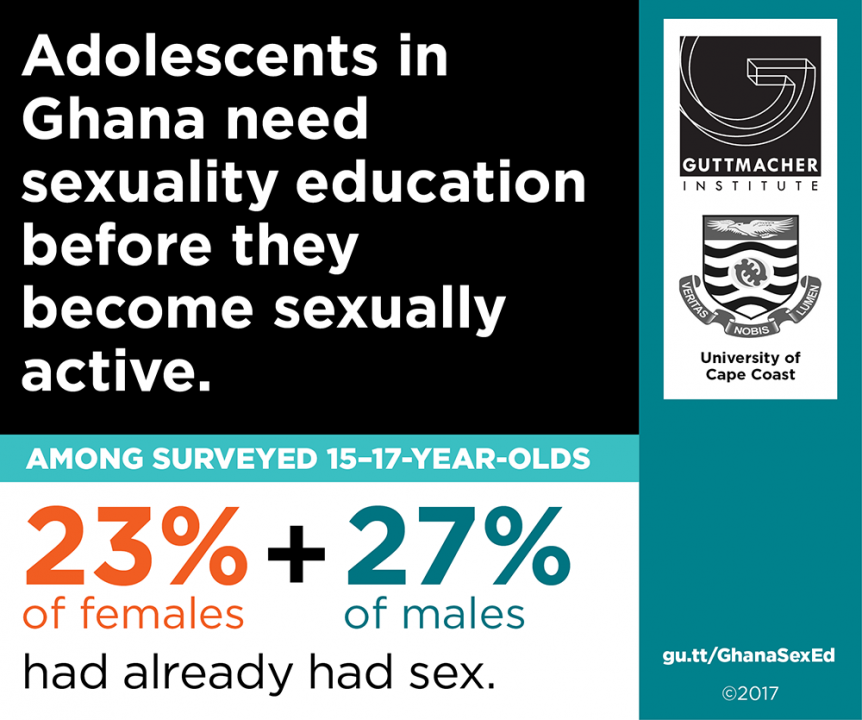Reproductive Health Education in Ghana should be strengthened to better meet adolescents’ needs
The government of Ghana, school heads, teachers, students and community members show strong support for the provision of sexual and reproductive health (SRH) education in schools. Yet a recent study indicates that programs in Ghana are not providing the full range of information that adolescents need. This finding comes from a study conducted jointly by researchers at the Ghana-based University of Cape Coast (UCC) and the U.S.-based Guttmacher Institute. The research team undertook an analysis of policies and curricula regarding SRH education in Ghana and their implementation in senior high schools, focusing on three geographically diverse regions: Greater Accra, Brong Ahafo and Northern.
Comprehensive SRH education is integral to ensuring that adolescents are equipped with the information they need to achieve healthy sexual and reproductive lives and to avoid negative health outcomes. Programs that recognize that sexual activity among adolescents is normal, that seek to ensure adolescents practice safe sex, that actively engage their participants, and that focus on rights, gender equality and empowerment have been shown to have positive impacts on several aspects of adolescents’ lives. The Ghanaian government has demonstrated strong commitment to SRH education by implementing programs in schools nationwide. However, according to international standards, comprehensive SRH education should cover a range of topics, which fit into five key categories identified by the study team: sexual and reproductive physiology; HIV/STI prevention; contraception and unintended pregnancy; values and interpersonal skills; and gender and sexual and reproductive rights.
In Ghana, the authors found that three-fourths of surveyed students had been exposed to at least one topic in each of the five categories, but only 8% of students reported learning about all of the topics that constitute a comprehensive program. Adolescents reported that they need practical information about how to prevent STIs (including HIV), how to prevent unintended pregnancy, and how to communicate and negotiate within relationships, issues not adequately covered in abstinence-focused curricula.
While SRH education in Ghana is advanced compared to that in other countries in the region, information is often presented from a reactive perspective, and focuses on the importance of abstinence and the dangers of sexual activity.
“Abstinence-only education programs have shown little evidence of improving adolescents’ sexual and reproductive health outcomes,” says Melissa Stillman, a Guttmacher researcher. “Rather, the adolescents surveyed report that they need practical information about how to prevent STIs, including HIV, how to prevent pregnancy, and how to communicate and negotiate within relationships.”
This study found that 23% of female and 27% of male students had already had sex at the time of the survey, and some likely did so before they were taught the skills and knowledge they need to practice safe sex and lead healthy sexual and reproductive lives. On the basis of these results, the authors recommend that age-appropriate SRH education start early in schools, well prior to sexual initiation. Primary and junior high schools are important points of entry for comprehensive SRH education, given that 85–90% of adolescents in Ghana attend these levels, but only half (48%) attend senior high school.
“Nearly half of the students we surveyed reported that they would have preferred to have had sexual and reproductive health education sooner than they did,” says Dr. Kofi Awusabo-Asare of the University of Cape Coast. “It is critical that this education begins early, prior to sexual initiation, to provide adolescents with age-appropriate, comprehensive and accurate information to make healthy choices.”
Teachers are the main source of information for students in Ghana, and the quality of teaching depends on their preparedness, confidence, knowledge and skills. Teachers from various disciplines cover SRH topics, leading to variability in emphasis. The report authors recommend that teacher training be standardized and improved to adequately prepare educators with the skills they need to teach these programs effectively.
To ensure the healthy development of adolescents and to support their transition to adulthood—as well as to match the strong commitment that the government of Ghana has shown over the years—the comprehensiveness of SRH education offered in core curricula must be improved to meet international standards, and appropriate resources must be provided to ensure adequate teacher preparation.
This study was made possible by grants from the Dutch Ministry of Foreign Affairs and the Swedish International Development Cooperation Agency. The views expressed are those of the authors and do not necessarily reflect the official policies of the donors.
For more information see the full report:
“From Paper to Practice: Sexuality Education Policies and Their Implementation in Ghana,” by Kofi Awusabo-Asare, Melissa Stillman, Sarah Keogh, David Teye Doku, Akwasi Kumi-Kyereme, Kobina Esia-Donkoh, Ellie Leong, Joshua Amo-Adjei and Akinrinola Bankole.
Read More:
Fact Sheet: Sexuality Education in Ghana: New Evidence from Three Regions
Infographic: Proportion of Students Who Are Sexually Active, Ghana
Infographic: Messages Conveyed by Teachers About Sex, Ghana
Infographic: Comprehensiveness of Sexuality Education in Ghana
Infographic: School Attendance and Timing of Sexuality Education, Ghana
Infographic: What Students Learn About Contraception in Ghana
Infographic: Teachers’ Training in Sexual and Reproductive Health Education, Ghana
